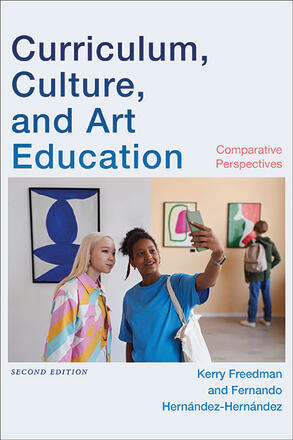
Curriculum, Culture, and Art Education, Second Edition
Comparative Perspectives
Through international case studies, this book explores the causes and effects of historical and contemporary cultural changes in art education.
Description
A general broadening of content and methods, a renewed emphasis on student interests, and diverse critical perspectives can currently be seen internationally in art curricula. This book explores ways that visual culture in education is helping to move art curricula off their historical foundations and open the field to new ways of teaching, learning, and prefiguring worlds. It highlights critical histories and contemporary stories, showing how cultural milieu influences and is influenced by the various practices that make up the professional field inside and outside of institutional borders. This book shows students how contemporary art educators are responding, revising, and re-creating the field.
Kerry Freedman is Professor of Art and Design Education at Northern Illinois University. She is the coauthor (with Richard Siegesmund) of Visual Methods of Inquiry: Images as Research, among other books. Fernando Hernández-Hernández is Emeritus Professor of Cultural Visualities and Arts-based Research at the University of Barcelona. He is the coeditor (with J.M. Sancho-Gil) of Becoming an Educational Ethnographer: The Challenges and Opportunities of Undertaking Research, among other books.
Reviews
"The second edition of Curriculum, Culture and Art Education: Comparative Perspectives is a timely collection of essays that expand our understanding of art education globally with its focus on the social turn in art education. The authors in this book, through a comparative case study approach, take up the challenge of settler colonialism and imperialism, which continues to shape our current living conditions, marked by increasing inequities across the globe. By addressing art education as a form of social action that is always informed by history, the book opens up new spaces to rethink how and why we teach art, aesthetics, and visual culture and in doing so allow us to reimagine the field of art education." — Dipti Desai, coauthor of Creating Third Spaces of Learning for Post-Capitalism: Lessons from Educators, Artists, and Activists
"In an era marked by heightened awareness of social transformation and global challenges, Freedman and Hernández-Hernández's Curriculum, Culture and Art Education, Second Edition emerges as a beacon of inspiration. Art education, intricately linked with cultural identities and societal norms, mirrors the dynamic nature of global culture. This book champions an international perspective in art education, illuminating the transformative power of visual culture on a global scale. Drawing from diverse perspectives and international case studies spanning five regions worldwide, the book delves into the impact of art education, examining historical legacies, colonial imprints, and postcolonial endeavors. Each chapter reveals the complexities of curriculum conceptualization, demonstrating unwavering commitments to fostering creativity, cultural sensitivity, responsive social engagement, and a comprehensive understanding of art education policies and practices. It goes beyond traditional boundaries, incorporating popular and local arts, digital technologies, environmental design, aesthetic education, and indigenous art forms and practices. In a world that heavily prioritizes rapid advancements in STEM fields, cultivating the ability to appreciate the transformative power of art is invaluable to address social injustices and nurture inclusive communities. Therefore, Freedman and Hernandez's new edition stands as a testament to the enduring relevance of art in shaping our collective efforts towards a more equitable future. With its rich tapestry of global perspectives, this book is a feast for the mind and a must-read to all educators." — Yichien Cooper, Assistant Professor at Washington State University, Tri-Cities and Higher Education Division Director-Elect, National Art Education Association
"In this second edition of Curriculum, Culture and Art Education—an updated and expanded one—editors Kerry Freedman and Fernando Hernandez-Hernandez bring together an outstanding collection of essays—based on international case studies—that capture and reflect art education discourses and practices in the Global North and Global South. In doing so, they curate a unique collection that travels not only across great distances—intellectually and geographically—but also across time. As a result, this collection, which offers international comparisons of art and design education, is indispensable for scholars, practitioners, and students of the field. With a commitment to visual culture theory and an emphasis on criticality, diversity, and student interest, essays in this collection expand frameworks for studying, understanding, and promoting visual arts education in the lives of young people, their teachers, and others. Together, the essays renew our understanding of the type of work that visual arts education does (and can do) in dismantling given ways of receiving and perceiving the world while amplifying the ways in which the visual arts are always already implicated and entangled in the lives that we lead, the worlds in which we participate, and the systems we critique or uphold." — Dónal O’Donoghue, Professor of Art Education, the University of British Columbia, Canada
Praise for the First Edition
"Curriculum theory and practice are central to the field of art education. … This book deals with unique glimpses of diverse international cultures through their aesthetics, education, politics, and spiritual systems. The international focus of this book is particularly important to the field of art education, and art educators in the US (no periods in “US”) and abroad will find it interesting and useful." — Elizabeth Delacruz, University of Illinois, Urbana-Champaign
"This timely collection will serve as a benchmark edition around which art education can be referenced in several countries/regions." — Graeme Sullivan, the University of New South Wales, Australia
"The authors have provided me with new knowledge. The book brings a new and broader perspective to existing research on the history of art education as it fosters awareness of developments across the globe." — Renee Sandell, Maryland Institute, College of Art
"Covering a wide range of cases worldly, this book helps to understand the movements, shifts, and tendencies in art education beyond Eurocentric and Western perspectives. A rigorous and well-founded book, crucial to understanding our entangled and complex present, reviewing the past, and imagining paths and lines to move to the future." — Judit Onsès Segarra, University of Girona